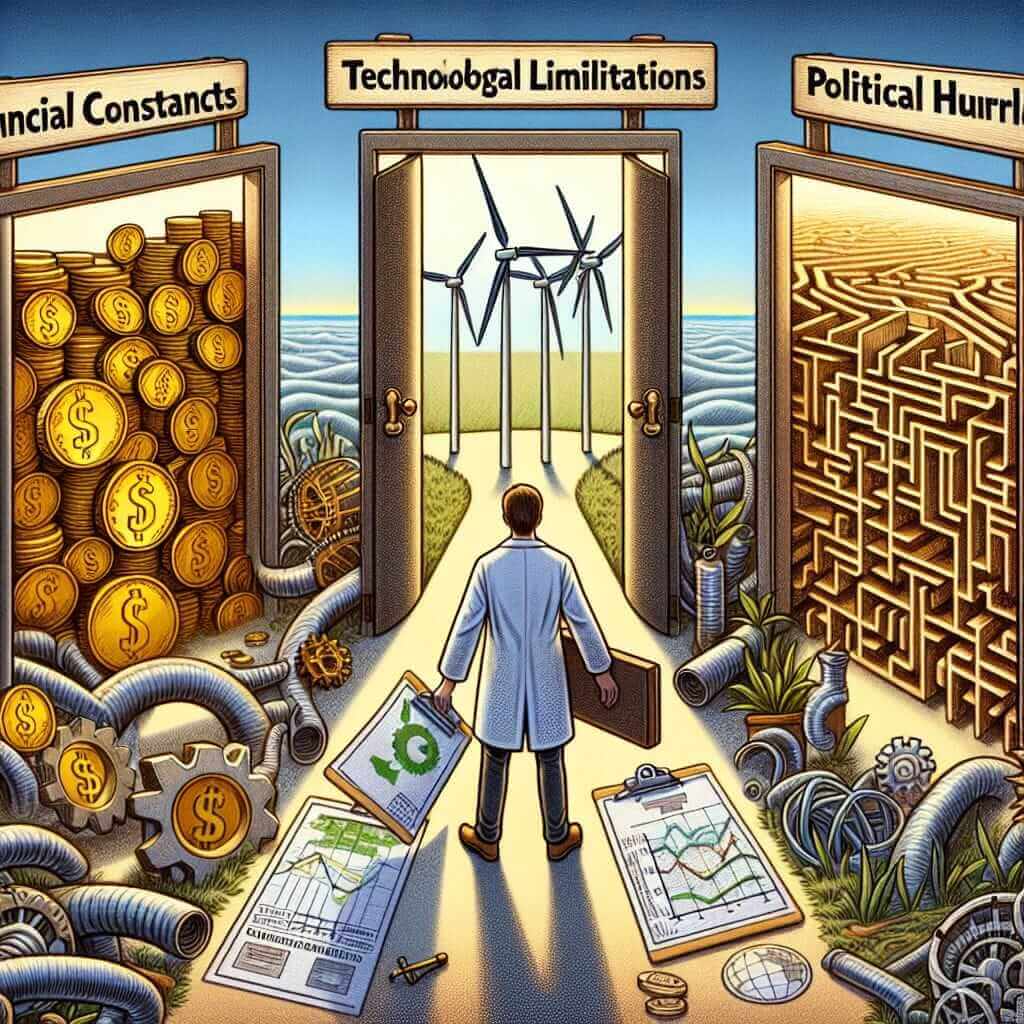The IELTS Reading section is a significant component of the IELTS exam, evaluating your ability to understand and analyze written texts. One trending and highly relevant topic in recent years is the global shift towards renewable energy. Specifically, “What are the challenges of achieving global renewable energy targets?” This topic has been and continues to be a focal point in real IELTS exams due to its importance in contemporary discussions. In this article, we will create a detailed and structured sample Reading test, address commonly encountered challenges, provide insights into common mistakes, and equip you with essential vocabulary and grammar points, ensuring you’re well-prepared for the IELTS Reading exam.
Reading Passage
Renewable Energy Target Challenges
As the world increasingly recognizes the urgency of addressing climate change, the transition to renewable energy sources becomes ever more critical. Governments around the globe have set ambitious renewable energy targets to reduce carbon emissions and promote sustainability. However, achieving these targets is fraught with numerous challenges.
One of the primary obstacles is the substantial financial investment required. Transitioning from fossil fuels to renewable energy infrastructure necessitates an initial outlay that many countries, especially developing nations, struggle to afford. This financial strain often slows down the pace of adoption and can lead to a reliance on traditional energy sources.
Technological limitations also pose significant challenges. Though advancements are being made rapidly, renewable energy technologies such as solar and wind power still face issues related to efficiency and storage. For instance, the intermittent nature of solar and wind energy means that they are not always available when needed, thus requiring significant advances in energy storage solutions.
Moreover, integrating renewable energy into existing grids is a complex process. Traditional grids are designed to handle a consistent flow of electricity from centralized power plants, whereas renewable energy sources often produce variable outputs. This mismatch can lead to grid instability unless substantial upgrades are made.
Political and social factors further complicate the scenario. Policy changes, regulatory hurdles, and public opposition can all impede progress. For example, the construction of wind farms often faces resistance from local communities due to concerns about their impact on landscapes and wildlife.
Lastly, achieving global consensus on renewable energy targets is challenging. Countries have different levels of economic development, resource availability, and political willingness. Aligning these diverse interests to a common goal requires substantial international cooperation and negotiation.
In conclusion, while the shift towards renewable energy is essential for a sustainable future, numerous challenges must be addressed. Financial constraints, technological hurdles, grid integration issues, and political and social factors all play significant roles in the complex landscape of renewable energy development.
Questions
Question Type: Multiple Choice
-
What is one of the primary challenges in transitioning to renewable energy sources mentioned in the passage?
- A. Lack of public interest
- B. Substantial financial investment required
- C. Availability of fossil fuels
- D. Technological advancements
-
Why is integrating renewable energy into existing grids complex?
- A. Renewable energy sources produce consistent power
- B. Traditional grids are designed for consistent flows from centralized plants
- C. Renewable energy is cheaper
- D. Traditional grids are already perfect
Question Type: True/False/Not Given
- Financial constraints are a significant hindrance for all countries, including developed nations.
- Renewable energy technologies are currently as efficient as traditional energy sources.
- There is unanimous global agreement on the necessity of renewable energy targets.
Question Type: Sentence Completion
- The financial strain of transitioning to renewable energy often results in a ___ pace of adoption.
- Public opposition to constructions like wind farms often stems from concerns about ___.
Question Type: Short Answer Questions
- What are two technological issues mentioned in the passage related to renewable energy?
- Which factors complicate the political and social scenario of renewable energy adoption?
Answers and Explanations
Multiple Choice
-
B. Substantial financial investment required
- The passage mentions financial investment as a primary obstacle in the transition to renewable energy.
-
B. Traditional grids are designed for consistent flows from centralized plants
- It is explained that traditional grids are not suited for the variable outputs from renewable energy sources.
True/False/Not Given
-
False
- The passage specifically highlights financial constraints as more burdensome for developing nations.
-
False
- It mentions ongoing technological challenges, indicating that renewable energy technologies are not yet as efficient as traditional sources.
-
Not Given
- The passage discusses the complexity of gaining global consensus, but does not specify whether there is unanimous agreement.
Sentence Completion
-
slower
- The financial strain often slows down the pace of adoption.
-
landscapes and wildlife
- Public opposition relates to concerns about the ecological and visual impact on local areas.
Short Answer Questions
-
Efficiency and storage
- These specific technological issues are elaborated upon in the passage.
-
Policy changes, regulatory hurdles, and public opposition
- These are identified as political and social complications that hinder renewable energy progress.
Common Mistakes in Reading Tests
- Misinterpreting True/False/Not Given questions.
- Overlooking key details or keywords in the passage.
- Making assumptions not supported by the text.
Vocabulary
- Substantial (adj) – /səbˈstænʃəl/ – Of considerable importance.
- Outlay (n) – /ˈaʊtleɪ/ – An amount of money spent for a particular purpose.
- Intermittent (adj) – /ɪntərˈmɪtənt/ – Occurring at irregular intervals.
- Grid (n) – /ɡrɪd/ – A network of lines that cross each other to form a series of squares or rectangles.
- Sustainability (n) – /səˌsteɪnəˈbɪlɪti/ – The ability to be maintained at a certain rate or level.
Grammar Focus
Complex Sentences
- Formula: Main Clause + Subordinate Clause (begin with conjunctions like because, although, since).
- Example: “Although renewable energy is crucial, achieving targets is fraught with challenges.”
Passive Voice
- Formula: Object + be + past participle (by subject).
- Example: “Substantial upgrades are required for grid stability.”
Tips for High IELTS Reading Scores
- Consistent Practice: Regularly practice with varied texts to improve reading speed and comprehension.
- Skimming and Scanning: Learn to skim for main ideas and scan for specific information.
- Time Management: Allocate time wisely to ensure you can complete all sections.
- Understand Question Types: Familiarize yourself with different question formats to answer more effectively.
- Expand Vocabulary: Enhance your vocabulary to better understand complex texts.
 Challenges of Renewable Energy
Challenges of Renewable Energy
By understanding and practicing with this sample topic, you will better navigate the intricate landscape of the IELTS Reading section and improve your chances of achieving a high score. Happy studying!


